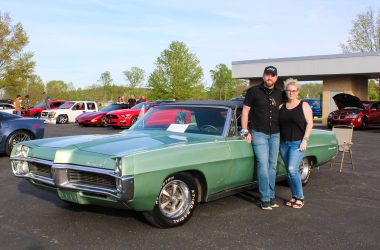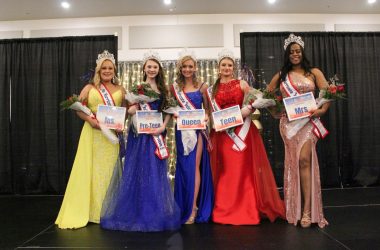By Irene Ambler
Editor’s Note — This article, first printed in the May 28, 1981 issue of the Breeze, captures a picture of law enforcement during the Great Depression.
Law and order was not so big a problem during the Great Depression era of the 1930’s. Possibly most folks had enough to do just to keep body and soul together and in trying to find something to put on the table for the next meal to get out and do a lot of law-breaking. Policemen were more respected then than they are now, also. I do not remember ever hearing our policemen being called a “pig,” nor did I ever hear of “police brutality.” Another thing we didn’t hear much about was “rights. Everyone had “rights” so long as they obeyed the law; and when they broke the law, they were put in jail.
Of course, during the Depression there were murders both in Hurricane and throughout the country; but these crimes of violence could usually be attributed to domestic problems or personal fights between individuals. I do not remember any crimes during the Depression whereby anyone just killed someone for the fun of it or for the purpose of robbery. There could have been people who were robbed and killed; but I cannot recall an instance such as that.
Some of the local stores were burglarized; but the robbers were caught and sent to jail. In fact, the most outstanding robbery I can remember was when a grocery store was robbed on Putnam Avenue. The robbers were from Huntington. Petty stealing was a problem, but not a very big one. I cannot remember a case which was burglarized, or any armed robbery of any kind in Hurricane during the 1930’s. Chicken stealing was big. Just about everyone who had chickens would eventually go to the hen house some morning and find that they had no chickens to feed. Those chicken thieves were very skillful, being able to pluck a fat hen off the roost without evoking a cluck, a cackle or a cockle-doodle-doo. My brother told me about some very well-known boys from respectable families in town who would rob the hen houses of local chicken growers and then sell the chickens to Mr. Lem Burdette, who had a store and who also would from time to time buy back unknowingly some of his very own chickens. My brother DID NOT steal chickens; but if I told you the names of the ones who did, you would be shocked. No, I will not tell you, because some of these chicken-takers are still around; and their high social standing would be besmirched if the truth got out on them.
I did not mean to make this story a saga of chicken-stealing. What I intend to write about is our Depression era police department. The entire police department of the town of Hurricane was composed of ONE man – Otis M. “Oat” Bias. Oat was the only town policeman for more years than I can possibly tell. I do know that he kept law in Hurricane through the entire Depression years, as well as (I believe) years before and many, many hears after the end of the Great Depression.
Oat died in the 1960’s and was well over ninety years of age. If he ever had an automobile, I never saw it. Neither did he have a scanner, radio equipment or a walkie-talkie. He always lived in the center of town and was on duty seven days a week and twenty-four hours a day. I do not remember that he had a vacation or even that he was off sick. He welked all over town on his patrol, but mostly, of course, his beat was on Main Street, where there were usually located three beer parlors. Her had a way of dealing with drunks and those beer parlor habitues who would every often decide to test their strength against another beer drinker. There were lots of fights, lots of arguments and sometimes the little jail behind the present City Hall would have overnight guess. Most usually, though, Oat would separate the fighters, settle them down real good and start them for home. Many a Saturday afternoon we would see Oat supporting a drunk or drunks and walking them up Putnam Avenue toward Hurricane Creek Road (or just near the city limits sign) and telling them in his authoritative voice, “All right, you Laddy Bucks, if I catch you back in town, you are going to jail.” He called everybody “Laddy Bucks.” the drunks would not try to resist Oat, but usually they would stagger their way on down the Creek or up Teays Valley, glad to be set free to go home instead of the cross bar hotel.
Oat was a strong, fairly large man, with dark hair, dark complexion and a sort of serous scowl on his face. No one dared argue with him, but usually did as he said. It was a different age when Oat Bias was town policeman; and while he handled the job without a great trouble then, he couldn’t do it now. I do not believe he would have had any patience with the drug scene, the juvenile delinquency, the speeding and the general society of today. Hurricane was a little town with small ideas; everyone knew everyone for miles around; and actually there was not so much crime and law-breaking. It was a good town, then.
My mother had a little Boston bulldog named Corky during the 1930’s. Corky was a house dog; and Mom was just crazy about him as we all were. Well, Corky was prone to act like any other dog, enthusiastically entering into local dog fights and dog romances at each and every opportunity which presented itself. Whenever Corky would get out of the house and run away from home to engage in dog activities, Mom would just go into a tizzy. She was afraid Corky would get killed. Oat Bias knew how much Mom liked corky; and during spring and fall seasons he would faithfully watch out for Corky. Corky, for some reason or other, would always end up on the main drag down in the center of Main Street or Virginia Avenue, or somewhere near the town jail. We got so we could depend on a telephone call from Oat concerning the incarceration of Corky. Now, Oat had a slight speech impediment; ad he called Corky “Cawky.” The phone would ring and there would be the deep voice of the town marshal, saying, “Mrs. Forth, I’ve got Cawky down there in jail.” He would actually put Corky behind bars, keeping him there until we would go after him and bring him back home. I believe that Oat knew every dog in town and knew each by name.
Currently, in my series about the town’s businesses during the Depression years I have been writing about local businesses and business people; but I also have to include the professions. Oat Bias was a professional policeman. I do not remember that he ever did any other kind of work except that of town cop. He was the police department from my earliest recollection; but I have no way of knowing how many years he served in that position. Oat and his wife had two sons – Virgil and Charles. Virgil was one of the first school bus drivers in this county. In the very early 1930’s the county school system, which had previously been operated on a district basis, was changed to what was called the “County Unit Plan.” At that time the transporting of students was done on a county wide basis. Virgil was a bus driver for many years; and he also served as a member of the House of Delegates. He has been dead for many years. The other son, Charles, now lives in Florida.
Possibly the most serous phase of law enforcement during those long-ago Depression years was that of moonshining and bootlegging. As you know, prohibition was repealed during the early years of Franklin D. Roosevelt’s first term of office. Moonshining, which had been a time-honored profession of this area, had long been flourishing in the hollers and on the hills of, not only Putnam County, but in most other southern and mountain states, and the repeal of the Eighteenth Amendment had little, if any, effect on the moonshiners and their profession. There was plenty of moonshining going on right around Hurricane and plenty of bootlegging the white lightning after it had been made. Lots of men who were too proud to take charity (which is what they called relief) fed and clothed their families by making moonshine; and many others supported their families by bootlegging the finished product. I knew a lot of moonshiners and also some of the bootleggers. I liked them all; they were just like other people; and they had a strict code of honor and honesty that was not found in some of the people who condemned them. I never could see why it was wrong for an individual to make and sell good whiskey to support his family and why it was right for a state to sell it. It seems that it was not really a moral or legal issue, but was rather just another way for the state to collect taxes. Well, I never did use the booze in any form; but I never could see where the payment of taxes could whitewash something that was supposed to be wrong. I still can’t.
I can remember one time when a man on High School Avenue (he doesn’t live there now) had a bathtub full of “Old Hen,” which was the name for mash made from corn chop, sugar and I don’t know what else. The mash was for making a batch of booze. The odors permeating the neighborhood evidently shook up some pious neighbor; and the neighbor had called the law. It happened just before noon; and we were in school close by. Well, the revenue agents emptied the mash in the man’s backyard; and it didn’t take us long to know that there was a lot of excitement over on the lower end of High School Avenue. We had an our for noon and we all went running over there to see what was so funny and exciting. It so happened that one of the neighbors had a flock of chickens which was allowed to run loose, as was the custom then. The chickens, which had probably been existing from what they could pick up off the soil, naturally just about went crazy over that bathtub full of corn chop, which was also nice and sweet; and was probably delicious if you were a chicken.
Did you ever see a drunk chicken? Well, I have. In fact, I as well as many other Hurricane residents saw a whole flock of drunk, clucking, cackling, crowning, staggering chickens. I swear that they were drunk as mojoes. There was only one rooster in that flock; and I’ll bet he had a rooster-sized hangover the next day. He was so drunk that he staggered from one end of that back yard to the other, falling and making peculiar noises for quite a long time, rising up valiantly and taking another bill full of that alcoholic delicacy. Finally, he did indeed pass out, falling over on his back, sticking his legs up in the air, kicking feebly a few times and eventually falling over on is side, lapsing into an alcoholic-soaked sleep which probably lasted most of the afternoon.
Bet you never saw a drunk rooster, did you? Well, I have. Fact is, lots of fun things happened in Hurricane back in those Depression days of not-so-long ago; it was a good town then to grow up in.


